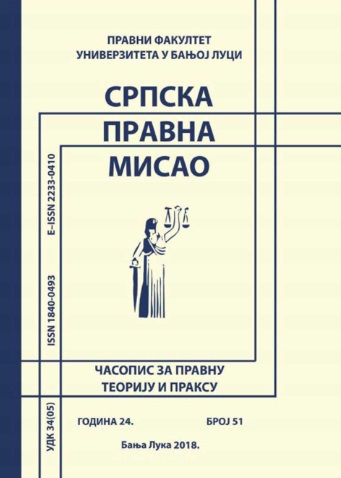NOTARY AS COURT COMMISSIONER IN PROBATE PROCEEDINGS
DOI:
https://doi.org/10.7251/SPMSR1851023RAbstract
The notary service was introduced into the legal system of Republika Srpska by the Law on Notaries, which was passed in 2004, and the first notaries started working on March 11, 2008. years. The law regulates the competence of notaries to undertake notarial processing of documents, issue notarial certificates and perform notarial certifications. In addition, the court or other authority can entrust the notary with the performance of other tasks that are in accordance with his jurisdiction. That's how notaries in order to relieve the burden of the courts in to the part related to the implementation of probate proceedings, and on the basis of the Law on non-litigation proceedings, this function was also assigned. The delegation of jurisdiction to notaries in probate proceedings practically began with the entry into force of the Law on Amendments to the Law on Non-Litigation Procedures, because, although there was a legal basis in Art. 145 of the Law on non-litigation procedure, due to the complexity, not a single probate case was assigned to notaries. The court is obliged to entrust the notary with the implementation of the probate procedure, and the notary is obliged to accept the case file, unless one of the participants in the procedure requests the implementation of the procedure exclusively before the court. The notary, as a trustee of the court in probate proceedings, can undertake all actions as well as the court. Exceptionally, the court can confiscate the file of the case from the notary and entrust the execution of the probate procedure to another notary or conduct the procedure itself. The court determines the notary and the deadline in which the probate procedure should be completed. In this way, the court controls the work of the notary, in addition to the corrective role it has in the case when disputed facts regarding the estate appear before the notary. For the implementation of probate proceedings, the notary has the right to a reward, as well as compensation for certain expenses, but in a significantly smaller amount than is the case when undertaking other tasks within his jurisdiction.
Downloads
Published
Issue
Section
License

This work is licensed under a Creative Commons Attribution-NonCommercial-NoDerivatives 4.0 International License.



